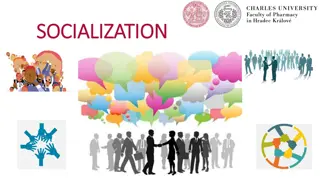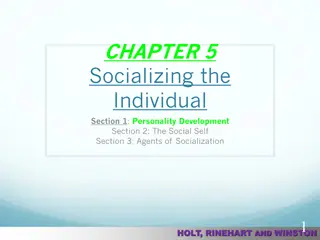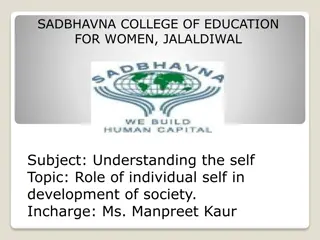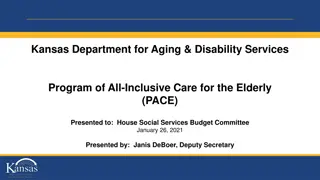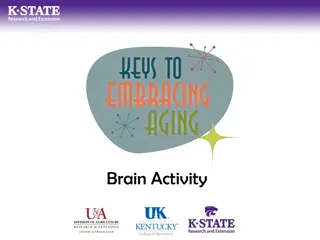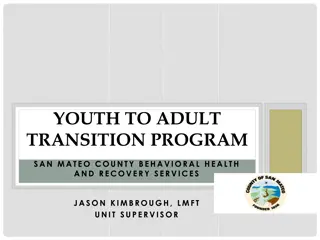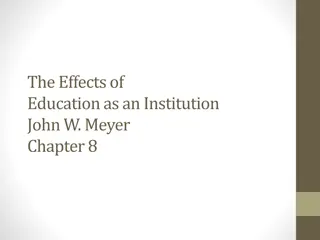
Importance of Socialization in Human Development
Socialization is a lifelong process through which individuals learn from others, shaping their personalities, skills, and roles in society. This article explores how socialization impacts various aspects of life and provides tips on effective socialization techniques.
Download Presentation

Please find below an Image/Link to download the presentation.
The content on the website is provided AS IS for your information and personal use only. It may not be sold, licensed, or shared on other websites without obtaining consent from the author. If you encounter any issues during the download, it is possible that the publisher has removed the file from their server.
You are allowed to download the files provided on this website for personal or commercial use, subject to the condition that they are used lawfully. All files are the property of their respective owners.
The content on the website is provided AS IS for your information and personal use only. It may not be sold, licensed, or shared on other websites without obtaining consent from the author.
E N D
Presentation Transcript
What is the socialization Socialization is the process by which children and adults learn from others. Many people think that socialization is especially important for infants and children. psychologists now realize that socialization continues all across the life span, as long as people continue to learn from social experiences.
How socialization is important Man is not born social. Socialization converts man, the biological being into man, the social being. Socialization contributes to the development of personality fm!rIj jraOkhg. Personality is a product of society. Helps to became disciplined jskhdkql=,j yeisrsug. It is the values, ideals, aims and objectives of life and the means of attaining them. Helps to enact different roles jsjsO N=usld ksrEmkh. Every individual has to enact different roles in his life
Provides the knowledge of skills l=I,;d jraOkh. Socialization skills help the individual to play economic, professional, educational, religious and political roles in his latter life.
. WAYS OF SOCIALIZATION 1.Socialization starts with the face and the body language. A smile indicates your willingness to know more about the event and the people attending it. 2.Keep a clean sense of humor. If you have the natural knack of making people laugh, then you would find it easy to socialize. 3. Be attentive throughout the conversation. Showing a sincere interest in what others are saying inspires a fruitful exchange of ideas.
4. Maintain an open and positive frame of mind. When joining a social activity, you should expect to encounter people of varied beliefs, nationality, religion, orientation and sensibilities. 5. Respect the distance and personal space of others. You may radiate with well-mannered interactive skills, but if others refuse to reciprocate your enthusiasm, move to another group that seems to be more welcoming.
Types of socialization 1. Primary socialization: It takes place in the early years of life of the new born individual. 2. Development socialization This kind of learning is based on the achievements of primary socialization. 3. Anticipatory socialization Men not only learn the culture of the group of which they are immediate members 4. Re socialization: It is not only do individuals change roles within groups, but they also change membership groups. 5. Broad socialization It is intended to promote independence, individualism and self expression
Primary socialization: becoming human Much takes place before age 5 Carried out by parents and family Includes: Language development Internalization of norms, values, etc. Establishing identity ( Who am I? ) Human development (Intellectual, Emotional, Social)
Anticipatory Socialization Preparing for a role. Examples: Education Training or practicing a sport or activity Choosing a major or career Internship, training Engagement Pregnancy
Resocialization Drastic form of adult socialization Changes entire environment, culture, and possibly self-concept Moving to foreign country Being institutionalized or incarcerated Joining military Total institution: controls all basics of everyday life, aimed at resocialization
Types of socialization 6. Narrow socialization It is intended to promote obedient and conformity 7. Natural socialization occurs when infants and young starts explore, play and discover the social word. 8. Positive socialization positive socialization is the social learning that is best on pleasure existing experience 9. Negative socialization negative socialization occurred when others use punishment.
Theoretical Understandings of Socialization Symbolic Interactionism - the self develops as a result of interrelated social interactions and interpretive processes. this approach also argues that socialization is a continuous, lifelong process Role Theory - socialization is seen as a process of acquisition of appropriate norms, attitudes, self-images, values, and role behaviors that enable acceptance in the group and effective performance of new roles
Theoretical Understandings of Socialization Reinforcement Theory - the self develops as a result of cognitive evaluations of costs and benefits Internalization Theory - socialization is a series of stages in which the individual learns to participate in various levels of organization of society
Cooleys Looking-Glass Self Charles H. Cooley s notion of the looking- glass self proposes that, like a mirror, the self develops through a process of reflection.
George Herbert MeadThe Three Stages of the I-ME Self George Herbert Mead s Mind, Self, and Society suggests that the self is the part of personal identity that has both self-awareness and self- image. development of self involves interaction with others.
I For Mead, the self consists of two parts: the I and the Me . These two parts essentially create the self through their interaction. The I Self is the part of us that is an active subject, our subjective sense of who we are. It seeks self-fulfillment, asking What do I want?
Me In contrast, the Me Self is the objective part of the self; the part of our self-concept that questions how others might interpret our actions. The Me understands the symbols that others give us, and seeks to find favorable reactions to our behaviors from others.
Socialization stages 1. Imitation stage the period from birth to about age 2, -children merely copy the behaviors of those around them. 2. Play Stage occurs around the ages of 2-4 years, during which children play roles and begin to take on the characteristics of important people in the world. 3. Game stage this stage begins at 4 years and never truly ends, it is the stage in which we begin to understand that others have expectations and demands placed on them called the generalized other According to Mead, the self develops in three stages:
Erik Eriksons Eight Stages of Development Erik Erikson proposed that humans develop a personality in eight psychosocial, or psychological and social, stages. During each stage, we experience a particular psychosocial crisis that will be resolved either positively or negatively, and each outcome will have an effect on our ability to deal with the next one.
Eriksons 8 Stages 1. Trust vs. Mistrust 2. Autonomy vs. Shame & Doubt 3. Initiative vs. Guilt 4. Industry vs. Inferiority 5. Identity vs. Role Confusion 6. Intimacy vs. Isolation 7. Generativity vs. Stagnation 8. Integrity vs. Despair
Theories of Socialization Freud: psychosexual development battle with id is re- enacted at each stage Oral stage (feeding) - basic trust develops when caregivers meet baby s needs. Anal stage (toilet training) symbolizes self control. Phallic stage (discovery of sexuality) child becomes romantically attracted to opposite sex parent. Internalizes gender roles (powerful but distant father, mother as caregiver, nurturer)
Theories of Socialization Freud: Stages of emotional development latent stage (quiet time) genital stage (puberty) early relationship with parents is resolved by healthy attraction to opposite sex. Ability to have strong emotional relationships depends on early experiences.
Jean Piagets Theory of Cognitive Development Jean Piaget focused on cognitive development, which relates to a person s ability to think and reason. Since the way we think helps shape our self- concept, cognition (thinking) plays a significant role in socialization. Piaget found that children don t think like adults.
Jean Piagets Theory of Cognitive Development Sensorimotor stage the stage (birth to 2 years) at which infants learn to experience and think about the world through their senses and motor skills. Preoperational Stage the stage (ages 2-7 years) which the ability to speak grows rapidly. Concrete Operational Stage (7 through 12 years old) at which children can think about objects in the world more than one way and start to understand causal connections in their surroundings. Formal Operational Stage (12 years and above) where people become able to comprehend abstract thought.



